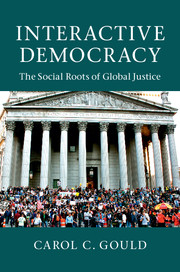Book contents
- Frontmatter
- Dedication
- Contents
- Acknowledgements
- Introduction
- Part I A theoretical framework
- 1 A human rights approach to global justice: elements of theory and practice
- 2 A social ontology of human rights
- 3 Interpreting freedom dynamically: beyond liberty and autonomy to positive freedom
- 4 Is there a human right to democracy?
- Part II The social roots of global justice
- Part III Interactive democracy – transnational, regional, global
- Works cited
- Index
- References
2 - A social ontology of human rights
Published online by Cambridge University Press: 05 September 2014
- Frontmatter
- Dedication
- Contents
- Acknowledgements
- Introduction
- Part I A theoretical framework
- 1 A human rights approach to global justice: elements of theory and practice
- 2 A social ontology of human rights
- 3 Interpreting freedom dynamically: beyond liberty and autonomy to positive freedom
- 4 Is there a human right to democracy?
- Part II The social roots of global justice
- Part III Interactive democracy – transnational, regional, global
- Works cited
- Index
- References
Summary
Introduction
The individualism of human rights has been regarded as both their strength and their weakness. As claims that individuals can make against the state and even perhaps against all other individuals for their fulfillment, these rights centrally appeal to an important notion of the inviolability of persons. Further, as pertaining to each individual simply in virtue of that person’s humanity, such rights have a universalistic, and in this respect an egalitarian, dimension, stretching in a cosmopolitan way across time and place. Nonetheless, this strength has at the same time been held to constitute a profound weakness in the very conception of a human right. Insofar as such rights assert basic claims of each individual against others, an emphasis on human rights is thought to neglect our social nature, and the need for social cooperation for the achievement of most human goods. This putative asociality would also divert attention from the problematic power relations and forms of oppression that most urgently need to be redressed in contemporary forms of society.
In this chapter, I consider the philosophical basis for human rights and argue – in contrast to such views – that human rights are in important ways based on sociality and are themselves fundamentally social or relational conceptions, in ways that existing interpretations of them most often fail to recognize. Such relationality at the root of human rights will be seen to go beyond the correlativity of rights to duties or of rights to responsibilities. Further, when properly interpreted, the fulfillment of human rights, when understood in connection with the central norm of equal freedom, is implied by any critique we might give of domination and exploitation. The recognition of human rights, I suggest, can foster social cooperation while at the same time preserve an important regard for individuality. In order to develop these sizable claims, I will appeal to what I have previously called social ontology and show its import for our understanding of human rights norms.
- Type
- Chapter
- Information
- Interactive DemocracyThe Social Roots of Global Justice, pp. 34 - 57Publisher: Cambridge University PressPrint publication year: 2014



